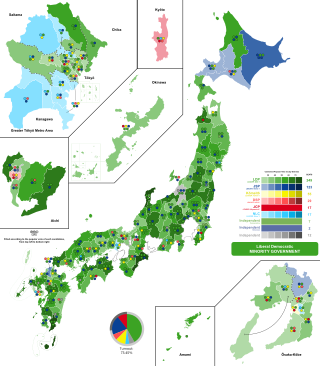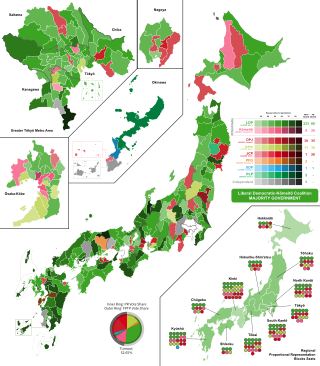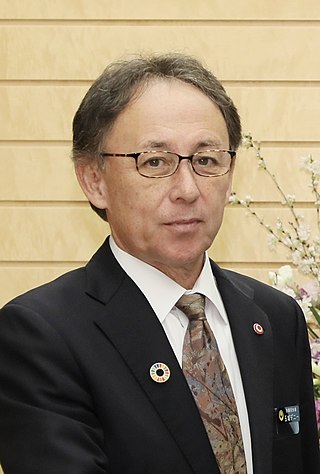Related Research Articles

The Japanese Communist Party is a communist party in Japan. Founded in 1922, it is the oldest political party in the country. It has 270,000 members as of 2020, making it one of the largest non-governing communist parties in the world. Kazuo Shii has been the party's chairman since 2000.

Minamimaki is a village located in Nagano Prefecture, Japan. As of 1 April 2019, the village had an estimated population of 2924 in 1091 households, and a population density of 22 persons per km². The total area of the village is 133.09 square kilometres (51.39 sq mi).

The Japanese political process has two types of elections.

The Japan Academy Prize (日本学士院賞) is a prize awarded by the Japan Academy in recognition of academic theses, books, and achievements.

General elections were held in Japan on 5 December 1976. Voter turnout was 73.45%. This election was noted for seeing 124 newcomers win seats for the very first time, along with the defeat of some legacy candidates, signalling a generational shift in the Japanese political landscape. To date, the 1976 election has been the only post-war general election triggered by an expiration of the term of the House of Representatives; all other post-war elections have been instigated by a dissolution of the House by the Cabinet.
Saitama, capital of Saitama Prefecture held a mayoral election on May 15, 2005.
Rikuzentakata, Iwate, held a mayoral election on February 4, 2007. Nagato Nakasato beat incumbent mayor Akihiko Yoshida.
Kunio Hiramatsu was the mayor of Osaka in Japan. He was elected in 2007 with centre-left support from the Democratic Party of Japan (DPJ), People's New Party and the Social Democratic Party, defeating the centre-right supported incumbent Jun'ichi Seki by 50,000 votes.
The 17th unified local elections in Japan took place in April 2011. In the first phase on April 10, 2011, 12 governors, 41 prefectural assemblies as well as five mayors and 15 assemblies in cities designated by government ordinance were elected. In the second phase on April 24, 2011, mayors and assemblies in hundreds of cities, "special wards" of Tokyo, towns, and villages were up for election. Additionally, a by-election for the National Diet was held in Aichi on April 24.
The 16th unified local elections in Japan took place in April 2007. In the first phase on April 8, 2007 13 governors, 44 prefectural assemblies as well as four mayors and 15 assemblies in cities designated by government ordinance were elected. In the second phase on April 22, 2007 mayors and/or assemblies in hundreds of cities, special wards, towns and villages were up for election. Additionally, by-elections for the national Diet were held in Fukushima and Okinawa on April 22.

General elections were held in Japan on 14 December 2014. Voting took place in all Representatives constituencies of Japan including proportional blocks to elect the members of the House of Representatives, the lower house of the National Diet of Japan. As the cabinet resigns in the first post-election Diet session after a general House of Representatives election, the lower house election also led to a new election of the prime minister in the Diet, won by incumbent Shinzō Abe, and the appointment of a new cabinet. The voter turnout in this election remains the lowest in Japanese history.

Yukihiko Ikeda was a Japanese bureaucrat and the Liberal Democratic Party (LDP) politician who served as foreign minister. He was in office from 11 January 1996 to 11 September 1997. Ikeda was known to be "Mr. No" in the political life.
Hokkaidō 2nd district was an SNTV four-member electoral district for the House of Representatives, the lower house of the National Diet of Japan, between 1947 and 1996, last used in the lower house election of 1993. Located in the prefecture (-dō) of Hokkaidō, it consisted of the cities (-shi) of Asahikawa, Rumoi, Wakkanai, Shibetsu, Nayoro, Furano and all other municipalities in the subprefectures (-shichō) Kamikawa, Sōya and Rumoi. With the return to single-member districts in the 1990s electoral reform, the district became the 7th district. In 2003 the 7th district was abolished and the area that was once the 2nd district was divided amongst the 6th, 10th and 12th districts of Hokkaidō.

Prefectural elections for the Tokyo Metropolitan Assembly were held on 2 July 2017. The 127 members were elected in forty-two electoral districts, seven returning single members elected by first-past-the-post, and thirty-five returning multiple members under single non-transferable vote. Four districts had their magnitude adjusted in this election to match population changes.

Okinawa 1st district is a constituency of the House of Representatives in the Diet of Japan. It is located in Okinawa Prefecture and encompasses the city of Naha and parts of Shimajiri District. As of 2016, 270,872 eligible voters were registered in the district.

The 2018 Okinawa gubernatorial election was held on 30 September 2018 to elect the next governor of Okinawa. As there are no term limits in Japan, incumbent Governor Takeshi Onaga was eligible for re-election before his death in August 2018. The election was originally scheduled to be held on 9 December 2018, but this was brought forward after Onaga's untimely death. Onaga's deputy, Kiichiro Jahana temporarily assumed his post for three days until being replaced as interim governor by Moritake Tomikawa. This was the first gubernatorial election in Okinawa since the voting age was lowered to 18.

The Constitutional Democratic Party of Japan is a liberal political party in Japan. It is the primary centre-left party in Japan and as of 2023 is the second largest party in the National Diet behind the ruling Liberal Democratic Party.

The 2022 Ishikawa gubernatorial election was held on 13 March 2022 to elect the next governor of Ishikawa, a prefecture of Japan located in the Chūbu region of Honshu island.

The 2022 Okinawa gubernatorial election was held on 11 September 2022 to elect the next governor of Okinawa. In the election, incumbent Governor Denny Tamaki who was backed by the Constitutional Democratic Party of Japan and some smaller parties ran against Atsushi Sakima who was supported by the Liberal Democratic Party and Komeito. Mikio Shimoji ran against both candidates as a third option. The potential relocation of the Naval Base Okinawa was, again, an important topic in the debate. Over 70% of voters in Okinawa opposed the relocation in the 2019 Okinawan referendum. Tamaki supported the complete removal of the base, while Sakima supported relocating it. Denny Tamaki won with 51.7% of the vote against Sakima and Mikio Shimoji.
References
- Results from JanJan (in Japanese)
- Japan Press coverage [ permanent dead link ]